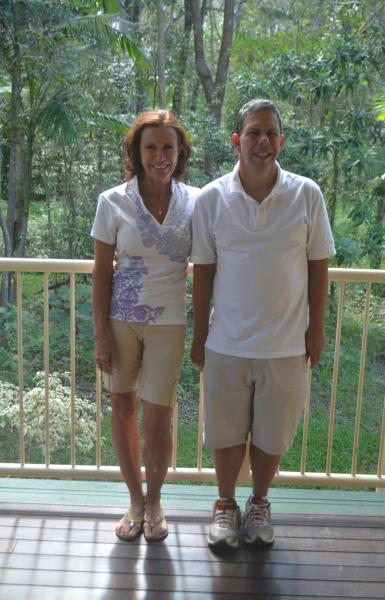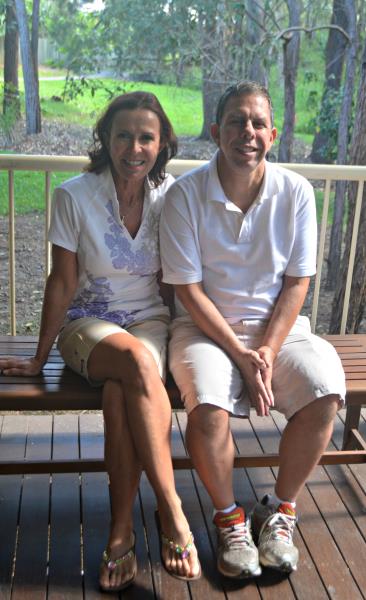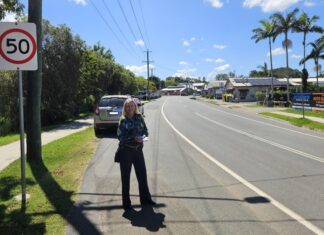By KATIE DE VERTEUIL
TROY Nicholls of Tewantin is one of those people whose smile immediately makes you feel welcome and at ease.
The 41-year-old’s bright personality, enthusiasm for life and voluntary work has made him a much-loved member of the local community.
It is only in the last four years however, that, thanks to government funding, Troy has been able to move out of home and into a small town house of his own.
You see, Troy was born with Williams Syndrome (WS) a genetic condition that is present at birth and affects one in 10,000 people worldwide.
His limitations are intellectual, with overtones of Cerebral Palsy.
A client at the Wallace Park Endeavour Foundation’s Learning and Lifestyle Centre since it first opened in 1998, Troy visits the centre three times a week.
His supported living arrangements mean that he is visited three times a week with in-house help for his cooking, shopping, bank and fitness.
With the National Disability Insurance Scheme (NDIS) to be progressively rolled out in Queensland from July 2016, Troy and his mum Kathleen Anschau are concerned that Troy’s current lifestyle may not be able to be maintained with the reforms.
“I think that most parents are as nervous as I am about what the government will be able to provide once the new scheme comes in,” Kathleen said.
“It is still such an unknown entity that we are dealing with.
“At the moment the government funding we are receiving provides a ‘very adequate lifestyle’ for Troy, my hope is that this is not sacrificed by the revision of the system,” Kathleen continued.
“That we are not any worse off through the NDIS.”
The NDIS is a radical new way of funding disability services and supports in Australia.
The most significant change is that funding for disability services and supports will be allocated directly to people with disabilities themselves rather than to service provider organisations and the introduction of individualised funding packages.
The ultimate aim of this is to ensure that Australians with disability – and their families, where relevant – enjoy far greater choice and control over all necessary services and supports.
It is hoped that all eligible Queensland residents will be covered by the scheme by 2019.
Troy and Kathleen will be one of many local families attending a NDIS Families Forum at Noosa on Wednesday 8 April.
Run by The Endeavour Foundation, the forum will be relevant to local families and is a great opportunity for Sunshine Coast residents to get answers to the questions they have about the NDIS.
There will be a range of guest speakers, including parents from Newcastle, whose adult sons both have intellectual disabilities. They will share their personal journey of being in an NDIS trial site and how they have learnt to navigate the scheme.
Other speakers at the event will include representatives from the Queensland National Disability Insurance Agency, and the Queensland Department of Communities, Child Safety and Disability Services
“As a parent it is really important that we are able to gain as much information as possible as we enter into this minefield that is going on right now,” Kathleen said.
“So it is great that there is an opportunity to answer a few questions at the upcoming forum.
“It’s been a big step in my life to move into supported living and I really like where I live,” Troy added.
“I really just want this meeting to be good, because I want to stay right where I am – that’s what I’m concerned about.”
The NDIS Families Forum will be held on Wednesday 8 April, at Endeavour Foundation Wallace Park Learning and Lifestyle, 54 Eumundi-Noosa Road, Noosaville. The session will run from 6pm to 8.30pm and all are welcome.
For more information 1800 363 328.
The NDIS reforms will see the disability sector:
* Moving away from eight separate State/Territory funding schemes to one uniform, national scheme.
* Changing from block funding of disability service provider organisations by governments, to individualised funding for people with disabilities based on individual needs assessments.
* Ditching Australia’s old welfare and charity model of disability funding, replacing it with a legislatively guaranteed “insurance” model whereby all Australians who meet the eligibility criteria are legally entitled to NDIS funding for all ‘necessary and reasonable’ supports.










